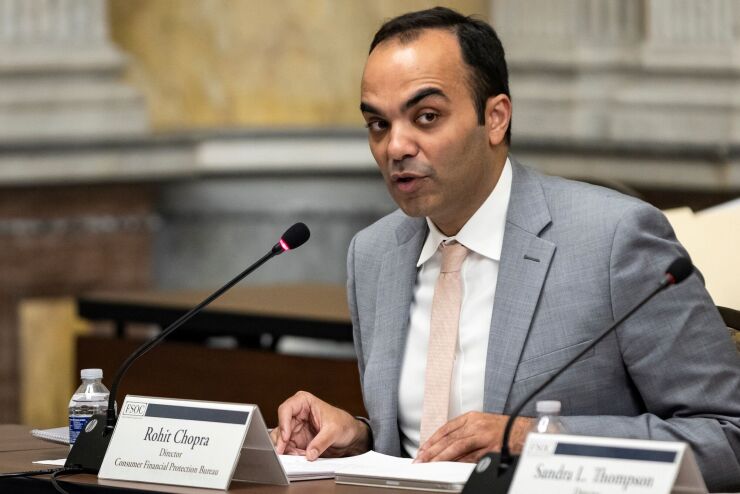
Shortly after Rohit Chopra became director of the Consumer Financial Protection Bureau, the agency began hiring more enforcement attorneys with the intention of ramping up investigations of big banks and repeat offenders.
But enforcement actions at the bureau stalled dramatically, with just four enforcement actions filed in five months. The holdup was a Supreme Court case challenging the bureau's funding, which stymied some litigation. When Justice Clarence Thomas wrote the majority 7-2 decision in May
"The CFPB will be able to forge ahead with our law enforcement work,"
Since the Supreme Court decision, the CFPB has filed 12 enforcement actions and resolved seven previously filed lawsuits. Now with just weeks before the presidential election — and a possible change in administration — the CFPB is working to get as many cases settled as possible.
"There was a fair amount of time when this big question — the constitutionality of the CFPB — was hanging over the agency," said Mike G. Silver, a partner at Husch Blackwell. "Now there is a separate dynamic, which is the case docket facing the election cycle dynamic."
Silver, who spent 12 years at the CFPB where he was a founding member of the office of regulations, noted that since the Supreme Court decision the CFPB has pushed forward with actions against
Due to rising tensions between the two parties, there often is an effort to leave little work for the next administration because one party doesn't want the other to get credit, experts said. Case dockets and the timing of Supreme Court decisions don't typically align.
"The agency is trying to close out cases before a potential transition," Silver said. "Each time there's a change in presidential administrations, you see an uptick in the number of announced enforcement actions at the end of the term."
Anthony DiResta, a partner at Holland & Knight, said that during the past few years under Chopra, the way the CFPB staff conducts its investigations is much more detailed and aggressive, more akin to litigation in antitrust investigations.
"Obviously they're not shy about going after big banks, making big headlines, pushing the envelope substantively. But in the trenches, procedurally, I see them being very aggressive," said DiResta, a former director at the Federal Trade Commission's Southeast regional office, who also was appointed as a special assistant U.S. attorney to prosecute consumer fraud.
Some companies that are under investigation have refused to settle with the CFPB, preferring to roll the dice if they think former President Trump is going to win reelection and a new director might view their cases more favorably. There is precedent to substantiate that strategy: After Mick Mulvaney became acting CFPB director in 2018 during the Trump administration, he
Under Chopra, the CFPB has pursued a strategy of taking action against large companies because they have a big market impact, with larger fines and restitution for consumers.
"This has been a CFPB that has been very proactive in using all of the tools with policy, enforcement [and] supervision, to affect changes in the banking industry that are positive for consumers," said Jesse Van Tol, president and CEO of the National Community Reinvestment Coalition.
The CFPB filed 29 enforcement actions in 2023, up from 20 in 2022. By comparison, former CFPB Director Kathy Kraninger filed 48 enforcement actions in 2020, and 22 in 2019. Mulvaney
Enforcement actions can take several years to develop and be made public, whether through a consent order, an administrative proceeding or a filing in a district court. In addition,
DiResta says there are three important things that companies need to do when they are dealing with the CFPB: create policies and procedures in writing, ensure that the policies are implemented through training and compliance, and respond quickly to consumer complaints.
"When companies get subpoenaed, a lot of the questions deal with 'How do you train your employees? How are managers compensated?' They want to know what kind of compliance information is going to senior management and the board so they will dig that deep into seeing how effectively compliance officers are doing their jobs," DiResta said. "You've got to develop credibility because they're the prosecutor, judge and jury. And when they do an investigation, the CFPB can close it with no action taken."
Silver said there is always going to be a volume of enforcement activity regardless of who is the director of the agency. He thinks a potential increase in enforcement actions will happen next year, depending on the outcome of the election.
Others see the CFPB firing on all cylinders.
"I think if you were to survey the nation's largest banks, my guess is that approximately zero would tell you that they feel the CFPB has been easy on them," said Van Tol.






